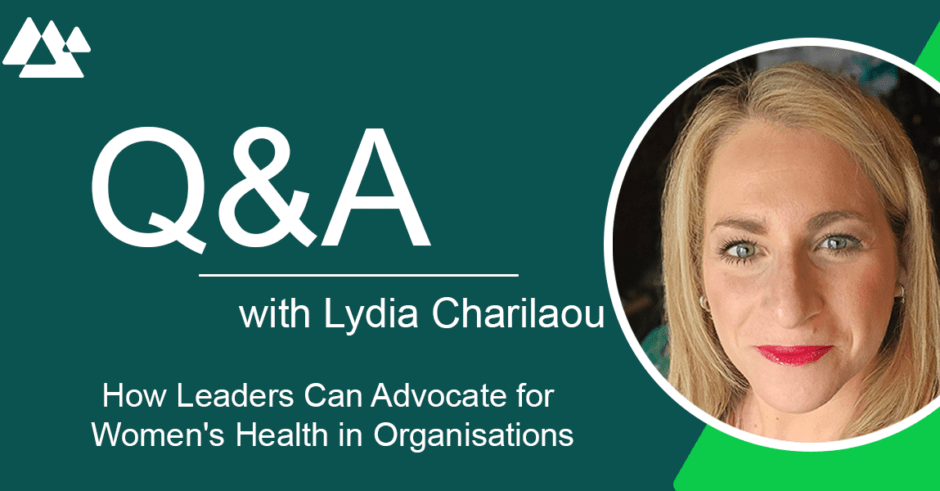In our fast-paced world, promoting physical and mental well-being isn’t just a checkbox, it’s essential for creating a vibrant, inclusive work environment. Despite women constituting 42% of the global workforce, only 31.7%* hold senior leadership positions. This disparity risks silencing women’s perspectives on workplace health. Let’s bridge that gap and ensure everyone’s voice is heard.
To explore this critical topic, we turned to Lydia Charilaou (Founder at Labyrinth Consultants), a trailblazer in fostering inclusive workplaces with over a decade of experience. Lydia’s passion for equity and firsthand knowledge of the intersection between wellbeing and workplace culture drives her to push boundaries and address taboo topics head-on. Her insights into transforming organizational cultures, championing diversity, and creating spaces where every voice matters are truly inspiring. Join us as we delve into her expertise and discover how leaders can advocate for women’s health and empower their teams to thrive.
Leading by Example
How Can Senior Leaders and Managers Lead the Way and Be Effective Advocates for Women’s Health?
Advocacy for women’s health, when combined with authentic leadership, fosters a supportive and inclusive workplace where policies, culture, and actions align to genuinely advance women’s well-being and career growth. Senior leaders and managers can effectively advocate for women’s health by:
Engaging the head and heart equally:
Organisations that want to make an impact in this space should begin by creating a safe environment and encouraging leaders to demonstrate healthy behaviours such as sharing personal stories to foster empathy. Moreover, to empower these behaviours, organisations should invest in educating leaders and employees about women’s health, both physical and mental. By fostering open discussions, authentic advocacy, and sharing personal stories, we can normalise conversations around women’s health in the workplace.
Creating Thriving Environments:
To ensure women thrive and excel within organisations, several key actions are crucial:
Inclusive communication on aspects such as health-supportive policies whilst simultaneously, mentoring and sponsoring women, advocating for their growth and overall well-being.
Measure success and continuous improvement by defining success metrics related to women’s health and transparently report on them.
Company Culture & ‘Taboo’ Topics
How Can Companies Create a Culture That is Open to Talking About Traditionally ‘Taboo’ Topics?
Creating a culture open to discussing traditionally ‘taboo’ topics requires intentional effort and supportive structures: The 3 main ingredients to this recipe’s success are Leadership Commitment, Psychological Safety and a Growth Mindset.
Demonstrated Leadership Commitment: I’ve witnessed this time and time again, leaders who model openness and vulnerability, whilst sharing their own experiences with sensitive topics, help normalise and encourage a trusting environment. This sends a signal that it is safe to share and that individual differences will be celebrated.
Psychological Safety: Organisations that prioritise fostering safe and open environments encourage spaces for honest dialogue. This could be in the format of forums like employee resource groups (ERGs) and open mic sessions. Places that encourage employees to share personal stories through internal communications, build empathy and understanding, whilst companies that also provide channels for anonymous feedback, encourage sharing concerns and experiences. Integrating discussions of ‘taboo’ topics into regular business activities, such as meetings and performance reviews will result in building employee trust and engagement.
Growth Mindset: The third pillar to breaking down ‘taboo’ communication barriers in the workplace are education and curiosity. Organisations that thrive in this space, respect differences, celebrate diverse backgrounds, and leverage insights from employee forums. They further empower leaders to openly share knowledge, equipping employees with the knowledge and practical application to engage respectfully. These strategies help curate growth opportunities that foster a supportive, inclusive environment where all topics can be discussed openly, enhancing overall organisational health.
Equity, Diversity, and Inclusion (EDI)
In Your Experience, How do Wellbeing and Equity, Diversity, and Inclusion (EDI) Intersect Within Organisations?
In my experience, wellbeing and equity, diversity, and inclusion (EDI) are intrinsically linked within organisations. When we talk about creating a workplace that genuinely supports its employees, we cannot overlook the importance of integrating EDI principles into our wellbeing initiatives. These concepts must be interwoven into the very fabric of our organisational culture, not just treated as standalone policies.
A truly inclusive and psychologically safe workplace is one where all employees feel valued, understood, and supported.
This means actively addressing the unique challenges that women and other marginalised groups face, especially concerning health and mental health.
It’s about recognising that wellbeing is multifaceted and that everyone’s experiences and needs are different.
Beyond Policies, What Development Programmes or Workshops Have Effectively Educated People on Women’s Health and Mental Health, Contributing to a Psychologically Safer and Inclusive Workplace?
Beyond policies, there are several development programmes and workshops that I have found to be particularly effective, 3 examples can be found below:
Comprehensive Women’s Health Workshops: These sessions focus on a broad range of topics from reproductive health to menopause, ensuring that women feel supported throughout different stages of their lives. They are even more impactful when they are attended by all genders creating a psychologically safe environment, normalising conversations, empathy and awareness around the same.
Mental Health First Aid Training: Equipping employees with the skills to identify, understand, and respond to mental health issues is crucial. The intersectionality of mental health and women’s health is a hot topic with suicide rates of women in menopausal age 45-54 rising by 6% in the last 20 years, according to the Office of National Statistics (ONS).
Inclusive Leadership Programmes: Leaders play a pivotal role in shaping organisational culture. Programmes that focus on developing inclusive leadership skills ensure that those at the top are committed to and capable of driving EDI initiatives. Outcomes of the programme include increased job satisfaction, innovation, creativity, proactive behaviours, trust and overall wellbeing. By implementing these programmes and fostering a culture of continuous learning and empathy, organisations can create a more psychologically safe and inclusive environment.
*World Economic Forum 2024 (https://www.weforum.org/agenda/2024/06/women-work-gender-gap-2024/)
Register for a FREE Launch session ( Why Holistic Inclusion Matters in the Workplace) with Lydia Charilaou here.




